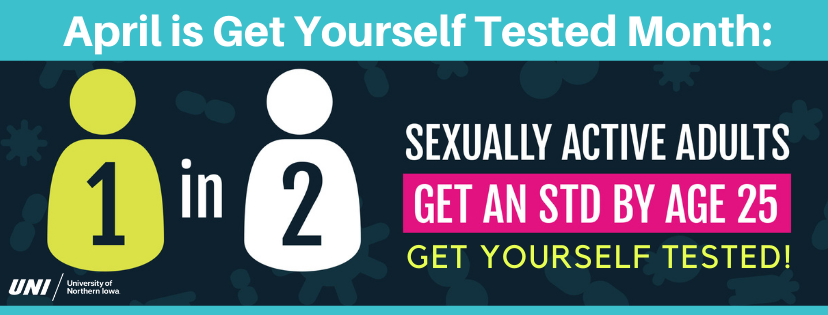National STD Awareness Month: Get yourself tested!
Student Wellness Services outlines different safe sex tips and encourages students to get tested.
Apr 12, 2021
The spring semester is winding down, and that means it’s time for exams and tests. One of the more important tests you can take is getting yourself tested for sexually transmitted diseases (STDs), also referred to as sexually transmitted infections (STIs); these terms are used interchangeably. STDs are more common than you may think – according to the Centers for Disease Control and Prevention, one in five people have an STD at any given moment. For folks aged 18-25, that number jumps to one in two, or 50%!
You can get an STD no matter how you’re hooking up. STDs are passed from vaginal, anal and oral sex, as well as genital skin-to-skin contact. Even if you are not experiencing symptoms, it is still recommended to get tested if you are sexually active as the most common symptom associated with an STD is no symptoms at all, meaning you may have an STD and may not even know it! STDs don’t discriminate based on the way you look, who you are or your sexual preferences.
An STD that is left undiagnosed, and therefore untreated, can result in potentially harmful health risks. However, there’s good news. Some STDs, like chlamydia and gonorrhea, are curable with antibiotics, and all STDs are treatable! For STDs that are not curable, symptoms can be minimal and well managed with treatment. However, treatment can’t start until you are tested!
Getting tested for STDs is no big deal! If you have been sexually active and want to get tested, getting tested for STDs is quick, easy and painless! You can make an appointment at the Student Health Clinic between 8 a.m.-4:30 p.m. Monday through Friday for STD testing. You can also make STD testing a part of your routine physical checkups to make sure your body is working the best it can be. To schedule an appointment, call the Student Health Clinic at (319) 273-2009. Tests can be run through your insurance or paid for out of pocket. The Student Health Clinic currently tests for the following:
- Syphilis
- Human Papillomavirus (HPV) for those who’s sex assigned at birth is female
- Gonorrhea
- Chlamydia
- Genital Herpes when symptoms are present
- HIV
You can also easily prevent STDs through using safer sex barriers, like condoms or dental dams. There are many locations on campus where you can acquire free latex condoms:
- Wellness/Recreation Center fitness center restrooms
- Maucker Union restrooms (women’s, men’s, gender inclusive)
- Rod Library restrooms (women’s, men’s, gender inclusive)
- The Center for Multicultural Education
- Gender and Sexuality Services
- Student Health Center (external and internal condoms, water-based and silicone-based lubricant, dental dams, latex -free condoms, condom carrier cases and more!)
Remember, STDs can spread through skin-to-skin contact. In order to have greater protection, consider using dental dams (a rectangular, flavored sheet of latex used during oral sex), latex or nitrile gloves or internal condoms. You can find more information about different safer sex barriers and their benefits on our website!
Another way to prevent transmitting or contracting STDs is to talk with your partner. Being open and honest about sexually transmitted diseases shows you care not only about your sexual health, but also your partner’s. Before you engage in a sexual relationship with someone, make it a point to bring up STD testing and utilize protective barriers such as condoms.
Getting tested for STDs is a basic part of staying healthy. The only way to know for sure if you have an STD is to get yourself tested!







